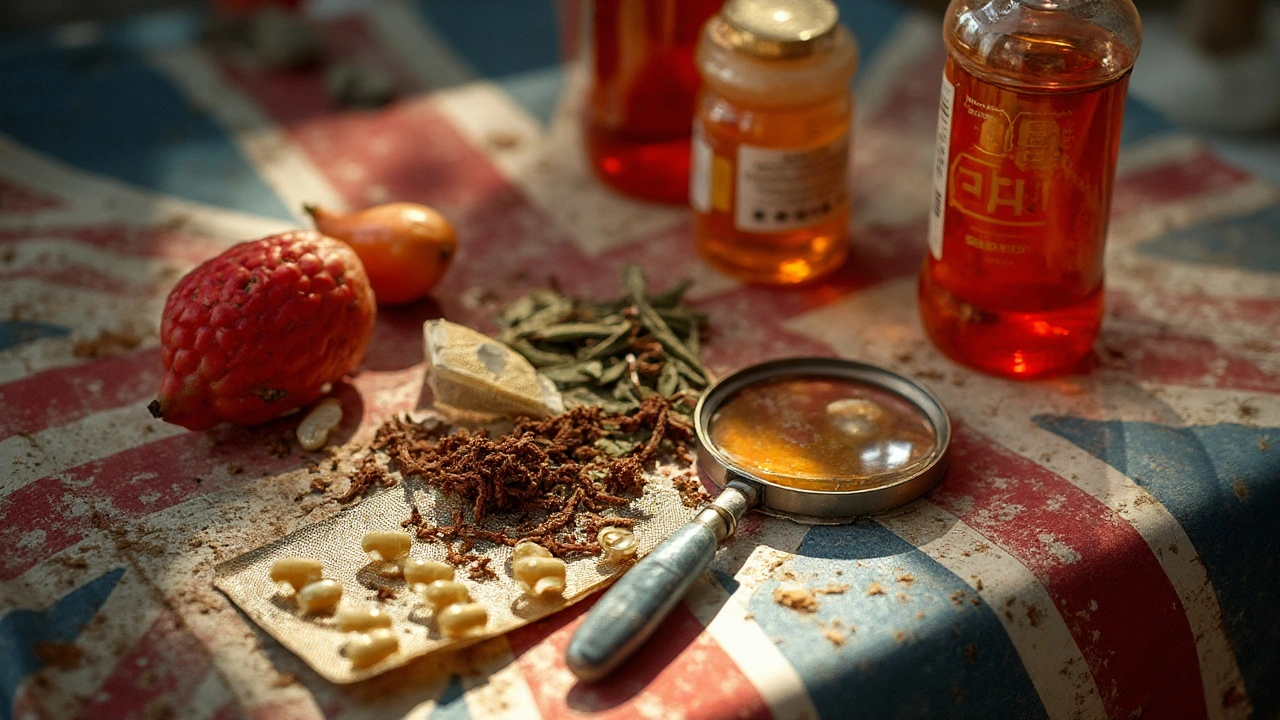Imagine a pill that promises to melt away those stubborn pounds, make you look great at weddings or on the beach, and maybe even perk up your energy. Now picture “Lida daidaihua,” a name that’s circled diet forums, online pharmacies, and dodgy WhatsApp group chats across the world. This little green-and-white capsule is a buzzword in the weight loss crowd, especially if you’ve spent late nights hunting for quick fixes or debated with mates who swear by shortcuts. But is this all hype, or is there actually something behind the legend?
What Exactly Is Lida Daidaihua?
First off, you can’t pronounce it without a little practice—‘dye-dye-hwa.’ Lida daidaihua is a supplement, usually sold as green and white capsules, pitched as a “herbal” weight loss pill. The star ingredient is daidaihua, the Chinese name for bitter orange. Some packs also rattle off promises about appetite suppression, faster metabolism, and even mood boosts. These pills first appeared in China in the early 2000s. Within a few years, they spread worldwide—Europe, the US, and right through Asia—mainly sold online, in some “herbal” or supplement shops, or under-the-table at salons and gyms. My own neighbour once tried sneaking some into the UK by ordering them from a sketchy website, and customs weren’t impressed.
Lida daidaihua’s labels tend to highlight plant-based contents—bitter orange extract, cassia seed, job’s tears, and sometimes ginseng or even hawthorn. But here’s the twist: early lab tests by agencies in the US and EU found that many batches actually contained undeclared drugs, usually sibutramine. This is a prescription-only appetite suppressant that got banned in a lot of countries (including the UK) around 2010 because of heart risks. From about 2013 onwards, you’ll find health authorities like the FDA, EMA, and UK MHRA warning people not to buy Lida daidaihua. And yet, you still see it for sale all over Instagram, obscure websites, and in suitcases from overseas.
What’s Really in the Capsule?
If it’s natural, it must be safe—right? Not so fast. It’s messy trying to pin down what you’ll actually get with a pack of Lida daidaihua. The product’s “herbal” ingredients can include:
- Daidaihua (bitter orange) extract: Contains synephrine, which can ramp up metabolism a little bit, similar to caffeine, but also raise blood pressure and heart rate.
- Cassia seed: Popular in Chinese medicine, meant to help with digestion.
- Job’s tears: Another medicinal grain, sometimes included in weight loss teas.
- Ginseng and hawthorn: These pop up in detox teas but have little actual weight loss science backing them up.
The headline issue is with those undeclared ingredients: lab tests, like one done by the FDA in 2013, often found sibutramine, a banned drug, or similar chemicals. This isn’t a mild over-the-counter product—it’s got the potential for hefty side effects, especially when mixed with caffeine, antidepressants, or medications for blood pressure. A few batches tested in Europe also had phenolphthalein and other substances linked to cancer risk and bowel irritation. Take a look at the table below for a quick roundup of the most common ingredients found, as tested by regulatory agencies:
| Ingredient | Effect | Known Issues |
|---|---|---|
| Daidaihua (bitter orange) | Appetite suppression, metabolism boost | Raises heart rate and blood pressure |
| Sibutramine (banned) | Suppresses appetite, weight loss | Increases heart attack and stroke risk |
| Cassia seed | Digestive aid | May cause diarrhoea in high doses |
| Phenolphthalein | Laxative effect | Linked to cancer, now banned in the EU |
If you order Lida daidaihua, you can’t really know what’s inside. Sometimes a pack contains just herbs. Sometimes it’s spiked with drugs. That’s the Wild West of “herbal” supplements—no one’s really policing the ingredient list, except to ban them once they’re found out.

Does Lida Daidaihua Really Work?
The honest answer: yes, but not for the reasons you might think, and not without big risks. People have lost weight taking Lida daidaihua. But in most of those cases, it was because the pill secretly contained real pharmaceutical appetite suppressants. Drugs like sibutramine or phenolphthalein will, no surprise, drop the pounds for many folks by kicking the body into overdrive or flushing out water weight fast. It’s not a miracle—it’s just risky pharmacology masquerading as an herbal fix.
If you look at proper research, there’s very little hard evidence that the main herbal ingredients, taken alone, will melt much fat. Bitter orange does have some mild effects on metabolism, but when studied against a placebo, the effects are usually small—certainly not the five- or ten-kilo promises you’ll see on Instagram. The real reason many claim it “works” is because of the hidden, dangerous additives, not the herbal stuff.
Worth noting: after sibutramine was pulled from the market around 2010, real results with Lida daidaihua started to nosedive, and side effects rocketed. That’s both scary and revealing. The professionals—doctors, dietitians, even pharmacists I’ve talked to—wouldn’t recommend these at all, especially since standard prescription weight loss aids in the UK are heavily regulated. When you ask honest users, the reviews are split between “lost loads, felt rotten” and “just didn’t work.” Most doctors I know would say: if something really helped you drop kilograms in weeks, with zero lifestyle change, be suspicious.
Besides, a 2016 study run by the Hong Kong Department of Health rounded up a bunch of popular “weight loss” supplements and found a staggering 26 out of 33 had banned drugs inside. Want to guess which topped the charts? Lida daidaihua. That’s not the best confidence booster if you want safe, predictable results.
What Risks Come With Taking Lida Daidaihua?
The list is longer than you might expect. Because you don’t always know what’s inside, you’re basically gambling with your health. The known risks tie back to the hidden drug ingredients, especially sibutramine. Here are some of the documented issues:
- Rapid heart rate – not the ‘just-caffeine’ kind, but pounding, sweaty, and sometimes irregular.
- Sharp increases in blood pressure. Folks with any heart or circulatory problems are playing with fire.
- Mood swings, anxiety, sleeplessness, and in rare cases, even hallucinations.
- Liver and kidney strain—several case reports out of Europe, plus at least three hospitalizations in the UK linked to Lida daidaihua.
- Sudden weight loss from dehydration, not real fat burning—meaning once you stop, the weight usually piles back on (I’ve seen this happen personally among friends).
- If mixed with other medications, things can get even dodgier. Sibutramine especially interacts with SSRIs (antidepressants) and lots of common meds.
- Digestive nightmares: cramps, diarrhoea, and what one bloke on a health forum summed up as “never trust a fart week.”
- Possible seizures in folks with underlying conditions.
If you’re under 18, over 60, pregnant, breastfeeding, or dealing with any heart or mood condition—these risks leap off the chart. Even my golden retriever Max seems to look at me sideways when I talk about unknown diet pills. The MHRA and the NHS flat-out tell you not to take these, and confiscations at airports happen every year, especially for products containing sibutramine.
You might think you can tell if something is “the real deal” by how it looks, smells, or tastes. That’s a myth. Packaging is easy to fake. Capsules get swapped. There’s no way to tell from a cursory glance—whatever a salesperson tells you. That puts the risk solidly on the buyer.

Safe Alternatives and Smarter Weight Loss Tips
So, if you’re thinking, “I need to lose weight and nothing else is working,” what are the other options? Safe, proven ways do exist—they just aren’t always as Insta-ready as popping a pill. The NHS’s Eatwell Guide is a smart place to start, blending the right balance of nutrient-dense foods (think more greens, pulses, lean poultry, less processed stuff). Most real, lasting weight loss comes from changing habits—portion control, regular meals, more walking (even throwing a ball for Max counts!), and a bit of strength training.
If you’re thinking about medical help, the options are there but regulated: orlistat (prescription only), certain GLP-1 injections, prescribed under medical supervision, and only for people who genuinely qualify by BMI and health risks. These aren’t perfect, but they’re safety-checked, and you’ll have someone monitoring your progress. Weight loss isn’t about magic fixes; it’s about what you can keep up for months—and years. And you’ll keep your heart, kidneys, and sanity intact.
Some people swear by intermittent fasting or a certain gym class that finally made things click. Others invest in apps to track progress, use step counters, or join support groups. I’ve seen my mates do “Dry January” (no alcohol for a month) and shed kilos without a single pill, just by dodging extra pints. The big thing: always check with your GP before trying anything new, especially if it’s something that’s banned, unregulated, or unknown—it’s their job to help you get there safely, not lecture you.
- Learn to spot red flags: “herbal,” “miracle,” or “no effort needed” is code for “probably sketchy.”
- Don’t believe every before/after snap you see online—there’s a reason so many are reposted or Photoshopped.
- If you must try a supplement, pick those with clear lab-tested results, transparent ingredient lists, and approval from a recognized health agency.
- Listen to your body—symptoms like sweating, racing heart, or drastic mood swings after a capsule are not worth it. Stop and see a professional asap.
Life’s too short to roll the dice with mystery pills, honestly. If you’ve ever watched Max, my golden retriever, joyfully chase a ball or nap without worrying about his waistline, it kind of puts the whole obsession with shortcuts into perspective. A bit of patience, real food, and some smart choices are leagues safer—and longer-lasting—than playing supplement roulette with your health.


Bernard Lingcod
August 4, 2025 AT 22:06While the hype around Lida daidaihua is tempting, the real issue is transparency. Most batches that have been tested contain undeclared pharmaceuticals like sibutramine, which throws the safety profile out the window. Even the “herbal” components, such as bitter orange, only give a mild metabolic nudge and can spike blood pressure. If you’re looking for a weight‑loss aid, stick to products that list every ingredient and have a clear regulatory approval.
Otherwise you’re basically gambling with your heart.
Raghav Suri
August 4, 2025 AT 22:56Stop buying mystery pills that hide banned drugs behind a cute logo. The regulators keep pulling them because they cause heart attacks, not because they’re “too cheap”. Anyone who swears they dropped ten kilos on a green capsule is either lying or risking a hospital stay.
Freddy Torres
August 4, 2025 AT 23:46Even the “natural” label can mask a pharmacy‑grade dose of sibutramine.
Andrew McKinnon
August 5, 2025 AT 00:36Sure, because “stop buying mystery pills” is the kind of high‑impact advice you can sprinkle across a subreddit without any nuance. The pharmacokinetics of synephrine versus sibutramine are worlds apart, yet the market treats them as interchangeable buzzwords. If you’re chasing a quick‑fire catecholamine surge, you’ll end up with tachycardia that feels like a marathon sprint in a hamster wheel. Bottom line: the risk‑benefit ratio is so skewed that even a seasoned endocrinologist would raise an eyebrow.
Dean Gill
August 5, 2025 AT 01:26When you read through the cascade of reports filed by the FDA, EMA, and various national health agencies, a clear pattern emerges: Lida daidaihua is less a supplement and more a delivery system for substances that have been explicitly banned for a reason. The first red flag is the frequent detection of sibutramine, a drug that was pulled from the market after a series of cardiovascular events, including myocardial infarctions and strokes, were linked to its use. Even when the label boasts “bitter orange” and “cassia seed,” those botanical extracts carry only modest thermogenic effects that are unlikely to produce dramatic weight loss without accompanying lifestyle changes. Moreover, the synergistic interaction between synephrine-a mild stimulant found in bitter orange-and hidden stimulants such as caffeine can amplify sympathetic nervous system activity, leading to heart rates that breach the 120‑bpm threshold in susceptible individuals. \n\nBeyond the heart, the kidneys and liver become collateral damage zones when the body attempts to metabolize unregulated chemicals like phenolphthalein, a laxative agent with carcinogenic potential that has been banned across the European Union. The gastrointestinal distress reported by users-cramping, diarrhea, and an unsettling “never trust a fart” sensation-are clinical hallmarks of such irritants. Adding to the danger is the fact that many users combine these capsules with prescription antidepressants or antihypertensives, creating a pharmacological cocktail that can precipitate serotonin syndrome or severe hypertensive crises. \n\nFrom a public‑health perspective, the proliferation of these products on social media platforms circumvents traditional safety nets, allowing counterfeit batches to slip through customs and reach consumers with minimal oversight. The anecdotal “I lost ten kilos in a month” stories are often cherry‑picked, ignoring the inevitable rebound weight gain that follows when the pharmacological effect wanes and the underlying caloric imbalance persists. In contrast, evidence‑based interventions-caloric deficit achieved through balanced nutrition, regular aerobic activity, and strength training-provide sustainable results without threatening organ systems. \n\nIf you still feel the pull of a quick fix, seek out supplements that have undergone third‑party testing and bear certifications from recognized bodies such as USP or NSF. Always discuss any new regimen with a qualified healthcare professional who can assess your individual risk profile. Remember, the safest path to weight loss rarely involves a mysterious capsule that promises miracles; it involves patience, consistency, and informed choices.
Royberto Spencer
August 5, 2025 AT 02:16In a culture that idolizes instant transformation, the moral calculus of endorsing a product that trades health for vanity becomes starkly apparent; we are complicit when we celebrate rapid weight loss without scrutinizing the hidden costs. The pursuit of a slimmer silhouette should never eclipse the duty we owe to our own bodies, which serve as the only permanent home we possess. Choosing a pill riddled with clandestine pharmaceuticals is tantamount to a Faustian bargain-short‑term gain at the expense of long‑term wellbeing. Ethical consumption demands transparency, accountability, and a willingness to embrace gradual, sustainable progress over dazzling but deceptive promises.
Annette van Dijk-Leek
August 5, 2025 AT 03:06Wow!!! This deep‑dive really opened my eyes!!! 🙌 If you’re even thinking about popping a mysterious capsule, STOP and read the facts first!!! Your heart, liver, and peace of mind are worth so much more than a quick “before‑and‑after” pic!!! Stay safe, stay informed!!! 🌟
Katherine M
August 5, 2025 AT 03:56Dear community, I would like to extend profound gratitude for the compassionate discourse presented herein. Your collective vigilance exemplifies the very ethos of responsible health‑seeking behavior. 🙏 While the allure of rapid results persists, we must remain anchored in evidence‑based practice and cultural humility. Let us continue to share verified resources, support one another, and uphold the highest standards of safety. 🌍